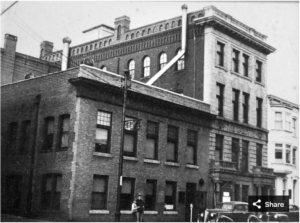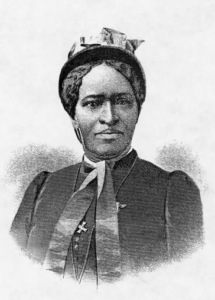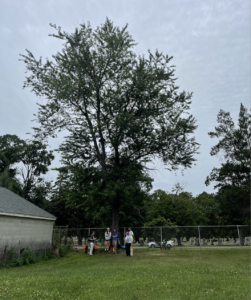Quiet farmhouse hosted York’s surrender
Surrender House
Near Locust Lane/Route 30, Farmers, Paradise Township
The situation
The invading general sized up his host, York County’s Jacob Atland, as a “staid and laborious farmer of German descent.”
With an eye to utility and the health of his family, the sturdy farmer had built his dining room immediately over a spring gushing from a cleft in a rock.
The general, Confederate John B. Gordon, took up the farmer’s invitation for breakfast in that spring room.
Here’s Gordon’s account, from his autobiography.
“As I entered the quaint room, one half floored with smooth limestone, and the other half covered with limpid water bubbling clear and pure from the bosom of Mother Earth, my amazement at the singular design was perhaps less pronounced than the sensation of rest which it produced. For many days we had been marching on the dusty turnpikes, under a broiling sun, and it is easier imagine than to describe the feeling of relief and repose which came over me as we sat in that cool room, with a hot breakfast served from one side, while from the other the frugal housewife dipped cold milk and cream from immense jars standing neck-deep in water.”

Peace seemed to reign at this farmhouse, sitting in a vale in the township with the apt name of Paradise.
Except for what Gordon stood for.
And why he was there.
And who was with him.
He was part of a 6,600-member enemy invasion force from a foreign country adept at stealing food, stomping fields and terrorizing citizens long its path to the Susquehanna.
Gordon accepted York’s formal surrender at his headquarters, Altland’s farmhouse, on Saturday, June 27, 1863.
“We entered the city of York on Sunday morning,” he wrote.
The surrender and occupation would change York forever. No town relishes commemorating a surrender – particularly one catalyzed by a young and reckless businessman, A.B. Farquhar, acting without authorization. And particularly one in which the town’s civilian leadership sought out the enemy to seek terms – two times – in a theater of war.
So discourse about the Civil War died off with the passing of veterans early in the 20th century – and then for the next 80 years, until a series of events connected with the 125th anniversary of the Battle of Gettysburg kindled interest in York County’s role in the Civil War.
Here’s the thing: When a town doesn’t talk about the Civil War, it does not engage with its racial history – race being the underlying cause for the Civil War. That sets back a town in its quest to form community across racial groups. That town – the city of York – is a community that is fighting to catch up.
More: York Pa.’s surrender at 160: ‘It was not York’s finest moment’ (ydr.com)
The witness
About 11,600 Confederates marched through the county from June 27 to July 1, 1863, as part of Confederate Gen. Robert E. Lee’s summer offensive.
The county was paying a major human cost of men in uniform in the Civil War. If the local documented casualties of the war – dead, wound and captured – were brought forward to today and adjusted for a higher population, York County would have experienced 11,000 casualties. The very cause of those deaths – a full division of the Confederate Army – was marching across York County. So much for peace in Paradise.
To understand the Confederate invasion of York County more clearly, we’ve assembled a series of quotes in which residents – with a few scholars sprinkled in – tell about that moment in the summer of 1863 in their own words:
The political climate
“The railroad tied York County’s economic interests to the South before the war, and for this reason many county inhabitants were reluctant to voice any opposition to slavery and the southern way of life. But York Countians had more in common with the South than just a penchant for southern money. They also shared many of the same values and political ideas of their southern neighbors.”
– Historian Mark Snell, assesses the county’s orientation toward Baltimore and other points south.
+++
“The people, so long blindfolded, will see the guilty demagogues who have used the negro for the destruction of white men. They will mark those who have sung of negro freedom only to destroy the white man’s liberty to earn bread for his starving family, and when they see all the terrible consequences of negro freedom and equality, the result will shake northern society to its very foundations.”
– York Democratic Press opines on Feb. 5, 1861, that freeing enslaved people would spell economic hardship for white families.
Warnings disregarded
“His invasion will destroy your property, will degrade you and your country, and if allowed to proceed without strenuous resistance, will make you objects of contempt and scorn to your own country, and the remainder of the civilized world.”
– Union Gen. William B. Franklin, native of York, writes to county residents, as the Confederates threatened Pennsylvania in June 1863.
+++
“With all this, there is not the least excitement here. No one is alarmed. Every one seems as indifferent as if there were no rebels within a thousand miles.”
– York attorney James Latimer assesses the preparedness of his home county against a Rebel advance.
Business, top of mind
“Is it true that you are going through York. I am interested because I have some property there.”
-A.B. Farquhar query to Confederate Gen. Fitz Lee in 1862, focusing on her own personal business interests. Lee responded that the Confederate invasions plans did not target York.
+++
‘That we could make a good deal better bargain with them than we could after they saw how little of our property we had been able to move … ‘My plan, however, was not seriously entertained. Then I told them I would take the responsibility of going anyhow – which I did.”
-Farquhar argued to ride out to meet the invading Confederates, again with business interests top of mind.
The raid’s impact
“Just as the bells rang, the cry was heard. ‘They are coming!’ Oh, Lissy, what did we feel like? Humiliated! Disgraced! Men who don’t often weep, wept then. “
– Cassandra Small writes about the Confederates entering York after city fathers, without a plan, surrendered to the Confederates in a farmhouse about 10 miles west of town.
+++
“We knew not how soon might come a signal to unleash the dogs of war in our midst and give your homes a prey to the invader.”
– Mary Fisher, after Confederates posted a picket outside her East Market Street home, expresses terror about the enemy’s presence.
+++
“Our next neighbor has proved himself a Secessionist! We all liked him and his family so much before. … He entertained the officers all the time… . Oh we have many such persons, but nobody speaks to them.”
-Cassandra Small shows the divide in town after some residents treated Confederate officers as friends.
+++
“The country people are beginning to come in. They were plundered indiscriminately particularly by a Louisiana brigade. Horse and mules taken, houses broken open, and everything the thieves fancied stolen.”
– James Latimer assesses damage after the Confederates withdrew – a battle was brewing in Gettysburg.
One enemy, two actions
“One old negro to whom was entrusted the duty of igniting the fuse sat very cooly on the edge of the pier, smoking a cigar.”
– From historian Scott Mingus, about Jacob Miller, who faced the Confederates as they rushed the Wrightsville Bridge. The bridge was mined with explosives to drop a span in the Susquehanna. His composure, in face of the enemy, contrasted with the harried uncertainty in York the day before as the enemy advanced.
+++
“Alone, and without authority to speak for the council, he rode off (to Abbottstown) in the early afternoon … .”
– Mingus explains about how A.B. Farquhar rode toward the Confederate camp to broker surrender terms with the Confederates. As Gen. Franklin predicted, that surrender brought contempt and scorn upon the county.
More: A series of quotes that explain York, Pa. during the Civil War (ydr.com)
The questions
The primary sources above capture the mood of York in 1863. Which quote resonates with you the most? How do eyewitness accounts add a layer of validity when it comes to discussing the past?
Related links and sources: Unsung farmhouse loud symbol of a shaping moment for York (ydr.com); James McClure’s “East of Gettysburg” and Scott Mingus’ “Flames Beyond Gettysburg.” Promo photo by York Daily Record. Top photo, Thomas Mingus.
— By JAMIE NOERPEL and JIM McCLURE



